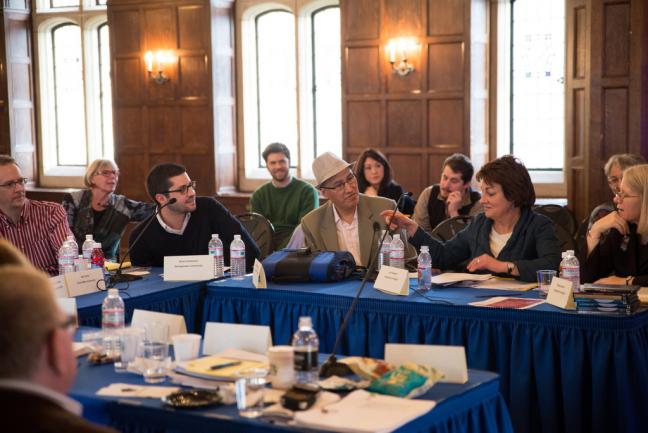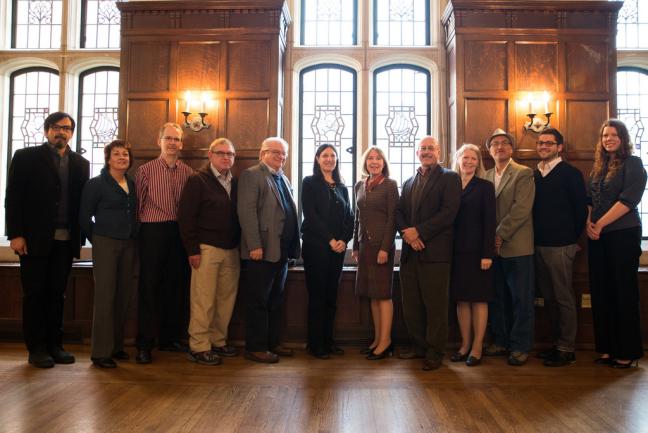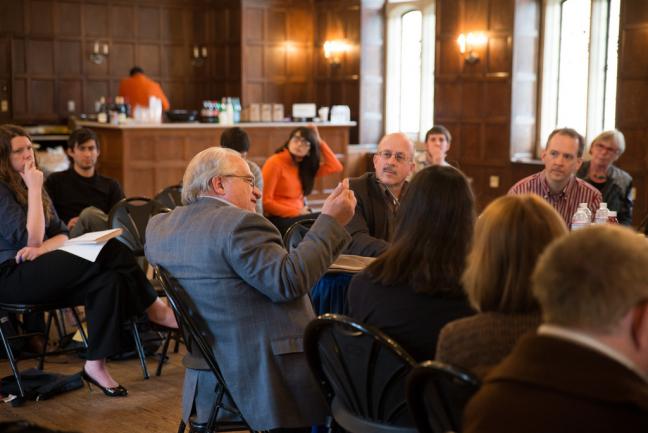Conferences & Events
Each academic year, the Americas Forum (AF) sponsors at least one conference on a transnational, cross-disciplinary theme and an assortment of other public events. Americas Forum also hosts, frequently in collaboration, a variety of shorter workshops and lectures which are also open to the public.
2022 Crossing Borders: Leaving Home, Making New Lives, Sustaining Communities
Challenges of migration shape our times. People facing lives of marginality mixed with violence leave homes for dangerous treks in search of new lives. They cross borders that governments seek to rule and regulate with limited success. Many aim to work, then return home. Others remain in el norte, often working without rights, sustaining transnational families and the U.S. economy. In time they build communities essential to the fabric of U.S. life.
The Crossing Borders series offers presentations by and conversations with leading analysts of the origins, processes, and outcomes of migrations between Mexico and the United States as they accelerated during the twentieth century and define key challenges of our times.
A full program with information about the presenters can be downloaded here.
Presented by the Georgetown University Americas Forum and Americas Institute
Part I: Leaving Home
Feb. 2: Women Crossing Borders: Family Migrations, 1890-1965
Larisa Veloz, History, University of Texas El Paso
Feb. 9: A Century of Mexican Guestworkers in U.S. Fields
Mireya Loza, History and American Studies, Georgetown
Feb. 16: The Big Push: Medical Miracles, Green Revolutions, and the Roots of Migrations
John Tutino, History and International Affairs, Georgetown
Feb. 28: Urban-Origin Migration: Industrial Monterrey in the U.S.-Mexico Migratory System
Rubén Hernández-León, Sociology and Mexican Studies, UCLA
Part II: Making New Lives
Mar. 28: Making Mexican Los Angeles — and America — in Boyle Heights
George Sánchez, History and Ethnic Studies, USC
Apr. 4: Making Mexican Chicago: From Post-War Settlement to the Age of Gentrification
Mike Amezcua, History, Georgetown
Apr, 20: Generations Making Mexican America
Francisco Jiménez, Literature, Santa Clara University
Tomás Jiménez, Sociology, Stanford University
Apr. 25. Carrying New York City Through Covid: Undocumented Deliverance
Martha Daniela Guerrero, Journalist/Historian
2014-2015 New Perspectives on the Americas
In 2014-15 Americas Forum will host a series titled New Perspectives on the Americas — each session will feature the author of a recently published book that aims to change our understanding of key issues in the Americas. Some are written by Georgetown authors, others by scholars of other universities. In every case, focus will be a conversation with another leading author-scholar, that will open to include audience participation.
All sessions will be Thursday evenings, 5:30 pm, ICC 450 unless otherwise noted.
20 November 2014, will feature Gregory Orfalea, Writer-in-Residence at Westmont College and author of Journey to the Sun: Junípero Serra’s Dream and the Founding of California, in conversation with John Tutino, Georgetown University and author of Making a New World: Founding Capitalism in the Bajío and Spanish North America.
Subsequent sessions:
19 March 2015, Denise Brennan, Georgetown University, author of Life Interrupted: Trafficking into Forced Labor in the US, in conversation with Patricia Zavella, University of California, Santa Cruz.
26 March 2015, Monica Prasad, Northwestern University, author of The Land of Too Much: American Abundance and the Paradox of Poverty, in conversation with Timothy Wickham-Crowley, Georgetown University.
9 April 2015: Mauricio Tenorio, History Department at University of Chicago, author of I Speak for the City: Mexico City at the Turn of the Twentieth Century, in conversation with Maurice Jackson, History Department at Georgetown University.
16 April 2015: Bryan McCann, Georgetown University, author of Hard Times in the Marvelous City: From Dictatorship to Democracy in the Favelas of Rio de Janeiro, in conversation with Brodie Fischer, University of Chicago. ICC 450
2013-2014 Conferences
“Catholicism in the Americas:
Historical Participations and Contemporary Challenges”
Friday, 21 March 2014, Copley Formal Lounge
9:30 am: Welcome – John Tutino, Director Americas Forum
Inaugural Remarks, John J. DeGioia, President, Georgetown University
10:00 am -12:00 noon: Brazil: Chair, Bryan McCann, History, Georgetown University
Historical Origins:
“The First Jesuit Missions in Brazil,” Alida Metcalf, History, Rice University
Contemporary Challenges:
“Local Religion and Local Musicking in Minas Gerais,” Suzel Reily, Anthropology, Queens University, Belfast
“Brazilian Catholicism in the Twenty-First Century: The Challenges of Globalization and Religious Pluralism,”
Manuel Vasquez, Religion, University of Florida
Lunch: 12-1:00 pm
1:00 – 2:30 pm: The United States: Chair, Timothy Meagher, Catholic University
Historical Trajectories:
“Creating New Borders: a U.S. Historian Looks Outward to ‘America,’” James McCartin, History, Fordham University
Contemporary Challenges:
“Priests, Participation, and People” Chester Gillis, Theology, Georgetown University
2:45 – 4:15 pm: Mexico: Chair, Julia Young, History, Catholic University
Historical Trajectories:
“Catholic Women in 19th-Century Mexico: Changing Roles in Church Institutions and Conservative Politics,”
Margaret Chowning, History, University of California, Berkeley
Contemporary Challenges:
“Liberation Undone: The Dismantling of the Liberationist Church and Its Consequences for Mexico,”
Jennifer Hughes, Religious Studies and History, University of California, Riverside
4:30-5:30 pm: Argentina: Chair, Marc Chernick, Latin American Studies, Georgetown University
Contemporary Challenges:
“Pope Francis and Argentine Catholicism: The Transformation of a Latin American Church”, Gustavo Morello, S.J., Sociology, Boston College
Comment and Discussiion: Matthew Carnes, SJ, Government, Georgetown University
5:30-6:30 pm: Reception
A program of the Georgetown Americas Forum, with generous support from Georgetown College, Georgetown Institute for Global History, Georgetown President’s Office, and Georgetown Center for Latin American Studies
REDES
Friday, 11 April 2014, 1:15 – 5:30 pm
McNeir Auditorium, Georgetown University
An exploration of Mexico and the Gulf coast region of Veracruz in the era of the Mexican revolution, 1910-1940. The afternoon will mix popular music, discussions of diverse peoples facing revolutionary challenges, examinations of the rise of the Mexican film industry, all focusing on the 1935 film Redes–a Mexican production, filmed in Veracruz, involving Paul Strand and Fred Zinneman, with music by the great Mexican composer, Silvestre Reveultas. The program will culminate with excerpts from the remastered film and selections from the score, performed by the GU orchestra, conducted by Angel Gil-Ordonez.
Details of program, topics, performers and speakers
1:15 pm: Son Jarocho—Traditional Folk Music of Coastal Veracruz
Trio Jarocho Guanchintón:
Alejandro D. Hernandez, guatarro de son and vocals
Keli Rosa Kabunoc, jarana, zapateada, and vocals
Daniel Herrera, leona, violin, and vocals
2:15 pm: Rethinking Revolution in Mexico and Veracruz
Chair: Sarah Bowskill, Lecturer in Latin American Studies, Queen’s University, Belfast, Ireland
“Revolutionary Conflicts, Contradictory Outcomes, 1910-1920”
Rodolfo Fernandez, Ph.D., History, Georgetown University, 2014.
“Can a Regime Be a Revolution? Mexico, 1920-1940,”
John Tutino, Professor, History and SFS, Georgetown University
“Rethinking Post-Revolutionary Veracruz: Society and Politics, 1920-1940.”
Heather Fowler-Salamini, Professor of History, Emerita, Bradley U.
3:45 pm: Film and Filmmaking in Post-Revolutionary Mexico:
Chair: Bernard Cook, Associate Dean, Director of Film and Media Studies, Georgetown University
“Dolores del Río and the Golden Age of Mexican Film”
Bárbara Mujica, Professor, Spanish and Portuguese, Georgetown University
“Paul Strand, Redes, and Mexico in the 1930s,”
James Krippner, Professor, History, Haverford College
5:15 pm: Redes and Revueltas: Selections
Georgetown University Orchestra, conducted by Angel Gil-Ordonez
A selected ensemble of the GU Orchestra will play selections from Silvestre Revueltas’
score while showing excerpts from the recently re-mastered 1934 film.
Sponsored by the Americas Forum, the Department of Performing Arts, the Institute for Global History, the Department of Spanish and Portuguese, and the Film and Media Studies Program—all of the Georgetown University College of Arts and Sciences.
This event is part of the Mexico Festival produced cooperatively by the PostClassical Ensemble, Georgetown University, the Mexican Cultural Institute, and the Clarice Smith Performing Arts Center at the University of Maryland
Son Jarocho comes from the sotavento, a region of Mexico’s southern Gulf coast that includes parts of the states of Veracruz, Oaxaca, and Tabasco. Redes was filmed at Alvarado, Veracruz, a fishing community in the heart of the sotavento. Since the mid-1940s, Son Jarocho has set roots in the United States. The Trío Jarocho Guantinchón will perform in the fandanguero style that has become a staple among jarocho performers and community participants at fandangos (community musical gatherings), social justice protests, and performance spaces.
Mexico lived a complex era of revolution and reconstruction from 1910 to 1940: mostly conflict from 1910 to 1920, a mix of conflict and reconstruction from 1920 to 1930, mostly reconstruction from 1930 to 1940. Mexicans struggled to build a more just and prosperous nation—while for many scholars, writers, and artists Mexico became beacon of promise in a troubled world.
In 1934, the Mexican government—which called itself a Revolution—sponsored the making of the film Redes. Fred Zinneman, an immigrant from Germany, joined in the production, Paul Strand came from the US to film, and Silvestre Reveultas, a Mexican composer of rising renown, wrote the score. The film was made on location using a local cast at the fishing port of Alvarado on the Gulf coast of Veracruz.
With a striking mix of scene and music, Redes explores the challenges of post-revolutionary times—with a tone of optimism. The film has been re-mastered by Martin Scorcese’s New Cinema Foundation; the sound track will soon be re-recorded by the Post-Classical Ensemble. Our conference is part of a series of events leading to the debut presentation of the re-mastered film with a live performance of Revueltas’s score by the Post-Classical Ensemble at the University of Maryland Clarice Davis Center for the Performing Arts on May 10, 2014.
Our symposium begins with a performance of Son Jarocho, the famed folk music of the Alvarado region. Then scholars will explore the contradictions of revolution in Mexico and Veracruz, the early film industry in Mexico, and Paul Strand’s roles in Mexico and Redes. We conclude with selections from Revueltas’ score performed by the GU orchestra, accompanied by excerpts from the film.
Participants:
Bernard Cook in Associate Dean of the College of Arts and Sciences at Georgetown and Director of the Program in Film and Media Studies. He is editor of Thelma and Louise Live: The Cultural Afterlife of an American Film (2007).
Rodolfo Fernández completed his Ph.D. in History at Georgetown in January 2014 with a dissertation on “Revolution and the Industrial City: Violence and Capitalism in Monterrey, Mexico, 1890-1920.” He is teaching at Brandeis University.
Heather Fowler-Salamini is Profesor Emerita of History at Bradley University. She is author of Agrarian Radicalism in Veracruz, 1920-1938 (1978) and Working Women, Entrepreneurs, and the Mexican Revolution: The Coffee Culture of Córdoba, Veracruz (2013) and coeditor with Mary Kay Vaughan of Women of the Mexican Countryside, 1850-1990: Creating Spaces, Shaping Transition (1994).
Angel Gil-Ordonez is Music Director of the PostClassical Ensemble and Music Director of the Georgetown University Orchestra. The former Associate Conductor of the National Symphony Orchestra of Spain, he has conducted symphonic music, opera, and ballet throughout Europe, the United States, and Latin America. He has recorded numerous CDs and DVDs, and gained honors from the king of Spain for promoting Spanish musical culture and a WAMMIE as best composer in Washington, DC, for 2011.
James Krippner is Professor and Chair of the History Department at Haverford College. He is author of Rereading the Conquest: Power, Politics, and the History of Early Colonial Michoacán, Mexico, 1521-1558 (2001) and Paul Strand in Mexico, 1932-1934 (2011).
Barbara Mujica is a novelist, short-story writer, essayist and critic—and Professor in the Department of Spanish and Portuguese and Georgetown. Her novels are Frida (2001), Sister Teresa (2007), and I Am Venus (2013). Among her many scholarly works are Women Writers of Early Modern Spain: Sophia’s Daughters (2004), Teresa de Ávila: Lettered Woman (2007), and A New Anthology of Early Modern Spanish Theater (2014).
John Tutino is Professor of History and International Affairs at Georgetown, and Director of the Americas Forum. He is author of From Insurrection to Revolution in Mexico: Social Bases of Agrarian Violence, 1750-1940 (1986) and Making a New World: Founding Capitalism in the Bajío and Spanish North America (2011), co-editor with Elisa Servín and Leticia Reina of Cycles of Conflict, Centuries of Change: Crisis, Reform, and Revolution in Mexico (2007), and editor of Mexico and Mexicans in the Making of the United States (2012).
2012-2013 Conference
“Becoming Indigenous, Asserting Indigeneity”
2011-2012 CONFERENCES
“Political Women in the Americas: Gender, Culture, Power and Public Life”
“Alternatives to the Nation: Cuba and the Andes in the Era of Independence, 1760-1860”
previous years
“Urban Transformations in the Americas: 20th Century Challenges”
“Mexico and Mexicans in the Making of the United States”
“Redefining America: Race, Migration and the Politics of Inclusion”.
“Inside the Corporate Panopticon”
“The Spanish Roots of Modern Liberalism: A Celebration of the Bicentennial of May 2nd, 1808”
“Hispanic Self-Fashioning: The Making of a Mexican-American Middle Class Identity”



